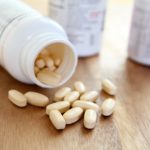Over the last few days, there has been a lot of buzz regarding the use of a nutritional supplement to reduce risk of postpartum depression. Quoting one of these articles: “‘Women who take the supplement don’t get sad [in the early days of motherhood],’ said Dr. Jeffrey Meyer, co-author of a study testing this blues-banishing regimen.” But before we get too excited about this supplement, we need to take a closer look at the study.
First of all, it is important to recognize that this study looked at risk for postpartum blues, not postpartum depression. But the blues are quite different from clinical depression. While postpartum depression is a persistent and often disabling depressive disorder, the blues are a transient mood disturbance, characterized by tearfulness, emotional lability, and anxiety. Because 65% to 85% of women report symptom of the blues after the birth of a child, we consider postpartum blues to be a normal event associated with childbirth and do not consider postpartum blues to be a psychiatric disorder. That said, it has been reported that severe postpartum blues may be either a risk factor for or a prodromal symptom of postpartum depression, so it is reasonable to hope that finding an intervention which prevents more severe blues symptoms might reduce risk for postpartum depression.
The nutritional supplement tested consists of 2 g of L-tryptophan, 10 g of L-tyrosine, and blueberry juice and extract and was initiated on day 3 after delivery. This specific combination was designed to regulate levels of monoamine oxidase A (MAO-A). This approach is based on prior research from the same group demonstrating that women with postpartum blues and depression had higher levels of MAO-A activity in the prefrontal and anterior cingulate cortex (PFC and ACC). The enzyme MAO-A is responsible for the degradation of certain neurotransmitters which modulate mood, including serotonin, norepinephrine, and dopamine. The researchers report that this supplement acts like MAO inhibitor antidepressants, decreasing the activity of MAO-A and thus increasing levels of these mood-regulating neurotransmitters. (The authors provide no scientific evidence in this paper or in other publications that this supplement actually has any effects on MAO-A activity.)
This was an open-label study where 21 received the supplement and 20 women in the control group received no treatment. The supplement was well tolerated; no adverse effects were reported.Depressive symptoms on Day 3 and Day 5 were measured using a visual analog scale (VAS) after a mood induction protocol (MIP). (They did not use scales typically used to assess postpartum mood, such as the EPDS, or postpartum blues, such as the Kennerly Blues questionnaire. Information on the Velten mood induction protocol is included below.)
Following the MIP, an increase in depressed mood was observed in the control group; however, this increase was significantly attenuated in the women receiving the supplement, with a large effect size of 2.9. In addition, there was an increase in depressed mood as measured on the Profile of Mood States (POMS) after the MIP in the control group. After the MIP, the POMS depression score increased by 8.95 in the control group and decreased by ?0.05 in the women receiving the supplement.
Shortcoming of the Study
While the findings of the study are intriguing, it is a pilot study with some very important shortcomings:
- Sample size: This was a very small study; 52 healthy women enrolled but seven dropped out (5 in the supplement group and 2 controls) after the first visit and another four were excluded from the analysis.
- Comparison group: The control group received no treatment. In a study assessing something as subjective as mood, it would be more meaningful to use a traditional placebo group and to follow the participants for a longer period of time. When the control group receives no treatment, it is more likely that the participants who are told they are receiving a treatment that may improve mood will feel better than women who are told they are receiving no treatment.
- Mechanism of action: The specific treatment in this study is derived from the finding that women with postpartum blues and depression had higher levels of MAO-A activity in the prefrontal and anterior cingulate cortex. The study would have been more convincing if they had provided data correlating response with modulation of MAO-A levels. The authors note that the supplement may have been effective because tryptophan induces sleep and improves sleep quality, which may have a positive impact on mood.
- Conflict of interest: According to the article, the lead author “is developing natural health products to overcome a high MAO-A state in early postpartum.” In addition, the senior author Jeffrey Meyer is developing natural health products and is listed as the inventor on a patent application for this dietary supplement.
The Biggest Problem
Although the publication itself is very careful to distinguish between postpartum blues and depression, the media has been less precise, labeling this new supplement as “mood busting” and “blues banishing”. And then there are the misleading headlines, such as “Postpartum Depression May Be Eased By Dietary Kit” and “Blueberries virtually eliminate baby blues by protecting ‘happy hormones’ in the brain”.
WAIT A MINUTE. There is absolutely no evidence whatsoever that this supplement reduces risk for postpartum depression. The researchers did demonstrate that this supplement worked better than no treatment in terms of reducing depressive symptoms on day 5, symptoms which would be consistent with postpartum blues, but they provided no evidence to suggest that the supplement reduces risk for postpartum depression.
If you read the fine print, there are some very important findings that do not make it into the abstract. When they looked a depressive symptoms measured using the Beck Depression Inventory (BDI) on postpartum days 3 and 5, there were no differences between the BDI scores in the two groups. In addition, they used the structured clinical interview (SCID) for Diagnostic and Statistical Manual of Mental Disorders, 4th edition (DSM-IV) to assess for depressive symptoms at three months postpartum, two subjects in the control group and one subject in the supplement group met criteria for a major depressive episode. (Because of the small sample size, this difference between the two groups was not statistically significant.)
It’s a great story; we all want it to work, we all hope that drinking a cocktail of amino acids and blueberry juice can reduce a woman’s risk for postpartum depression. However, we need more data to support the efficacy of this intervention. For now, we would not recommend this supplement kit as the sole intervention for women at high risk for postpartum depression.
Ruta Nonacs, MD PhD
Dowlati Y, Ravindran AV, Segal ZV, Stewart DE, Steiner M, Meyer JH. Selective dietary supplementation in early postpartum is associated with high resilience against depressed mood. Proc Natl Acad Sci U S A. 2017 Mar 13.
Sacher J, Rekkas PV, Wilson AA, Houle S, Romano L, Hamidi J, Rusjan P, Fan I, Stewart DE, Meyer JH.Relationship of monoamine oxidase-A distribution volume to postpartum depression and postpartum crying. Neuropsychopharmacology. 2015 Jan;40(2):429-35. doi: 10.1038/npp.2014.190. Epub 2014 Jul 30.
The Velten Mood Induction Protocol (from Dowlati et al. 2017)
The Velten method, a series of 60 read self-referent statements, is the most widely used technique for studying affective influences upon behavior and it has demonstrated effectiveness in altering subjective emotional states. Negative statements reflect pessimism, dissatisfaction, or lethargy (e.g., “life is a heavy burden”). An example of a neutral statement is “an orange is a citrus fruit.” Subjects were asked to read each statement, printed individually, first to themselves and then aloud, and to “feel and experience each statement as it would apply to you personally.” In addition, to facilitate the MIP, the subjects also listened to music while reading the statements. The subjects listened to Prokofiev’s “Russia Under the Mongolian Yoke” for the sad MIP and to Mozart’s “Piano Concerto No. 21 in C Major” for the neutral MIP.
For more information:
Velten E. The Induction of Elation and Depression through the Reading of Structured Sets of Mood-Statements. University Microfilms; 1967. University of Southern California, Ann Arbor, Michigan
Velten E. A laboratory task for induction of mood states. Behavioural Research and Therapy, 1968. 6: 473-82








Leave A Comment